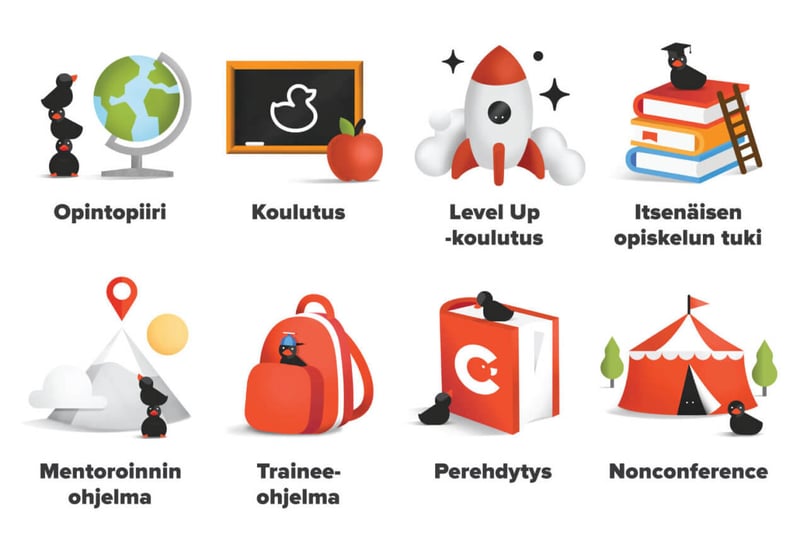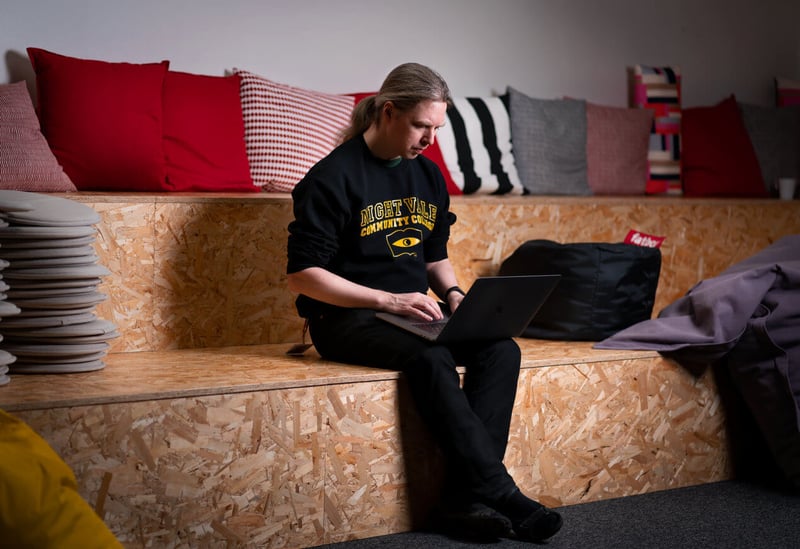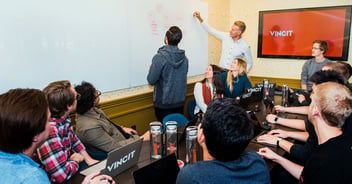Even though the name may make you think of a university, Univincity is a fairly agile establishment. During the first two years of its existence, we’ve already tested several different modes of operation and also managed to uncover some gems while catering for different needs. We are on a constant look-out for new methods and models. We just have to wait and see how long this blog series will become over time!
Univincity is based on employer responsibility and comprehensive consideration of the Vincitizens’ needs. We always aim at cost-efficiency, individuality, and a timely pedagogical approach that helps a person internalize the things they learn. These points will be covered in more detail below.
Employer responsibility
The core of “new employer responsibility” comprises competence and well-being. These two aspects are intertwined: If a person feels good, they have the capacity to develop themselves. At the same time, development and the growth of personal competence generate well-being. We try to take both of these aspects into consideration, with our people team focusing on well-being and Univincity on competence.
Competence is one of the key components of today’s professional life, which is why we want to continuously grow our Vincitizens’ competence capital. Stretching to a time before the founding of Univincity, Vincit has a long history of promoting development. Vincit’s early development initiatives included services such as
- goal and development dialogs aimed at identifying one’s own competences, and a service called “Please give me feedback” which anyone could use to ask for feedback on their work
- coaching, mentoring and three-year plans to support self-direction
- several competence-related initiatives designed to help with identifying and implementing next steps.
Univincity did not replace any of the old activities but only added more opportunities to the mix.
Comprehensiveness
Competence development is so central to expert work that it doesn’t stop at work but extends to comprehensively cover the expert’s entire attitude toward life. The desire to learn new things isn’t bound to office times, and this is something we’ve embraced. Our employees receive a "compdev bonus" when they use their free time for competence development – say, for pursuing their own ambitious projects, for instance. A compdev bonus can be given for a maximum of 10 hours of competence development per month, as we do not want to encourage any kind of excessive behavior. The recompense is €20 per hour, regardless of the person’s salary.
Some people quickly raise a valid point after hearing about our compdev system: is competence development only supposed to be carried out on one’s free time? Here at Vincit, the answer is no. By granting the compdev bonus, the employer only acknowledges that the employee is using their free time to develop their competence. However, competence can also be developed during office hours. Competence development takes different forms depending on whether it’s done at work or on one’s free time, so why settle for one way of competence development when you can have two!
There’s always something to develop. The compdev bonus is not available to all members of staff, since things like one’s life situation may prevent people from using their free time for competence development. That said, it should be borne in mind that competence development doesn’t only benefit the person who takes the time to develop themselves. A competent colleague is an asset to the entire community and a great partner for learning together.
The compdev bonus considerably expands Univincity’s scope of activities. Even though it’s possible to achieve great things during work hours, even more things can be achieved by increasing the time used on development.
Cost-efficiency
The thing that structures Univincity’s activities the most is the fact that Vincit isn’t a mere educational facility and the center stage is occupied by Vincit’s client projects. Although the company is ready to invest in competence development, the costs need to remain reasonable.

The easiest way to ensure this is to provide Vincit’s experts with interesting things to do in their projects as this enables competence development through learning by doing. This means that a great deal of the pressure of competence development actually falls on Vincit’s sales team. All in all, they have done an amazing job: according to our learning survey, the majority of Vincitizens felt they were learning on the job either because the project allowed them to work on things they weren’t familiar with before or because the project made them face new challenges.
However, competence development cannot rely solely on things learned by doing project work. This is why Vincit also organizes a range of learning events that cover a wide variety of topics and methods. These, too, can be organized cost-efficiently, as long as you use a bit of imagination and have the courage to challenge established ways of working. To give some examples: Do we need to use our time for producing our materials, or can we just buy ready-made ones? Does everyone need to be present and do everything together all the time, or are there parts that can be done independently and more easily as project work?
Univincity is for individuals
At Vincit, we tend to think along the lines of the constructivist approach that workplace learners are individuals who are driven by different motives and act in different ways. In an ideal world, we would be able to offer each individual their own customized training. Having a range of methods up our sleeve makes this possible at least in part.

In addition to more traditional training, Vincit offers more agile study circles and level up training sessions for small groups. We also run our internal mentoring and trainee programs, the latter of which we use to recruit promising junior coders. Each Vincitizen can use the opportunities provided by Univincity the way they want.
Take Pasi Välkkynen for example. He got his Scrum master certificate and took part in Vincit’s own project lead training in the fall of 2019. After this, he applied for Vincit’s internal mentoring program in January 2020 with the aim of deepening his Scrum master skills. In early 2020, Pasi also attended the newly launched Coach Your Product Owner study circle.
– Getting certified and taking part in lead training gave me some great insights. They especially sparked my interest in the role of Scrum master and in how a Scrum master can coach the Product owner of their team to success. Next, I will deep dive into these topics by becoming a mentor and participating in a study circle, Pasi summarizes.

Pasi came to work at Vincit because he just wanted to code in peace for once.
After a couple Vincit years, however, Pasi rekindled his love for other types of work and ended up developing his project lead skills with the help of Univincity.
Time to think
Just about everyone in the IT industry must at some point in their career have taken a two or three-day course culminating in a certification exam: In the course of an 8-hour training day, the instructor goes through a deck of several hundred slides. If everything goes well, the participant then ticks the correct boxes in the multiple-choice questionnaire and gets their certificate. But is this type of course really about learning or proving that you actually know something you already know? The most likely answer is the latter since the learning itself has probably taken place over a significantly longer period.
Taking it slow yields the best results in learning. If you think about learning to play piano, you can just as well take lessons for 8 hours on one day or for one hour on 8 consecutive days or 8 consecutive weeks. The typical solution is to have one one-hour lesson a week, in addition to which the teacher gives the student some homework since “practice makes perfect”. Univincity aims to apply this same principle. Instead of getting one longer training event, an important topic receives a series of shorter events, which all deal with the same theme and revisit things that have already been learned. This gives the learner time to think. At its best, this type of arrangement also provides some flexibility for people with busy schedules and varying needs.
Timeliness
When learning takes place during project work, the learning is as timely as it gets: the things the learner picks up are put to use right away. One of the biggest challenges Univincity faces is the question how the things discussed at various educational events, such as study circles and various training opportunities, can be immediately applied to work to deepen the learning experience. This is something we still need to work on, but as they say, necessity is the mother of invention.
We are currently testing a project team-internal study circle and a Level Up training concept that is carried out in small groups, both of which aim at making the learning as timely as possible. The mentoring program also typically aims to deepen the learner’s knowledge of a topic they normally deal with in their work. In other words, there are many different approaches that can be used. The key is to choose the one that’s right for the situation.
The later parts of this blog series will discuss Univincity’s different modes of operation. Stay tuned for more true-life stories about workplace learning at Vincit. Follow our blog and never miss a post!
Also published in this blog series:
Study circles promote a sense of community in long-term workplace learning
Trainee program for top coders of the future
Univincity’s mentoring program has a far-ranging impact



